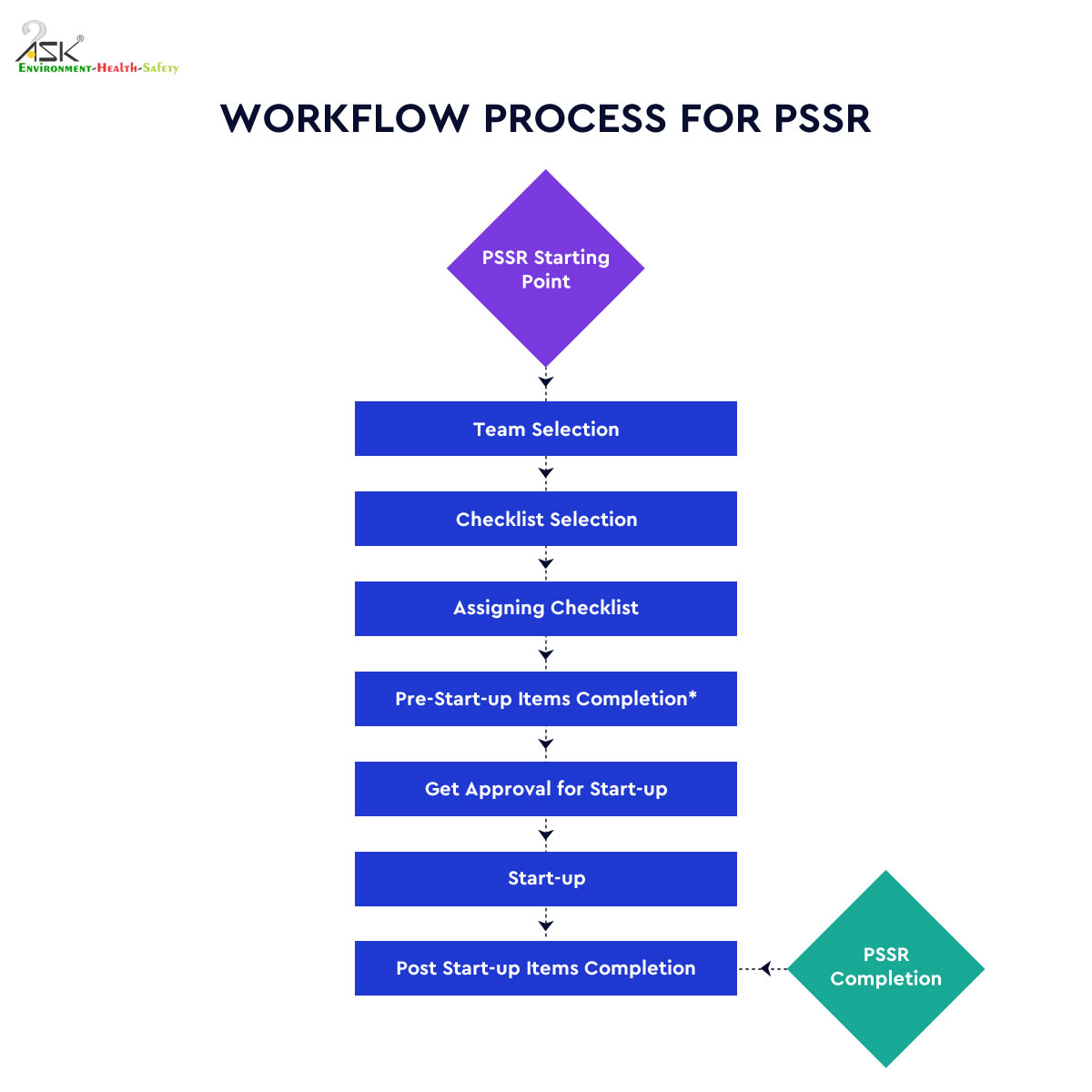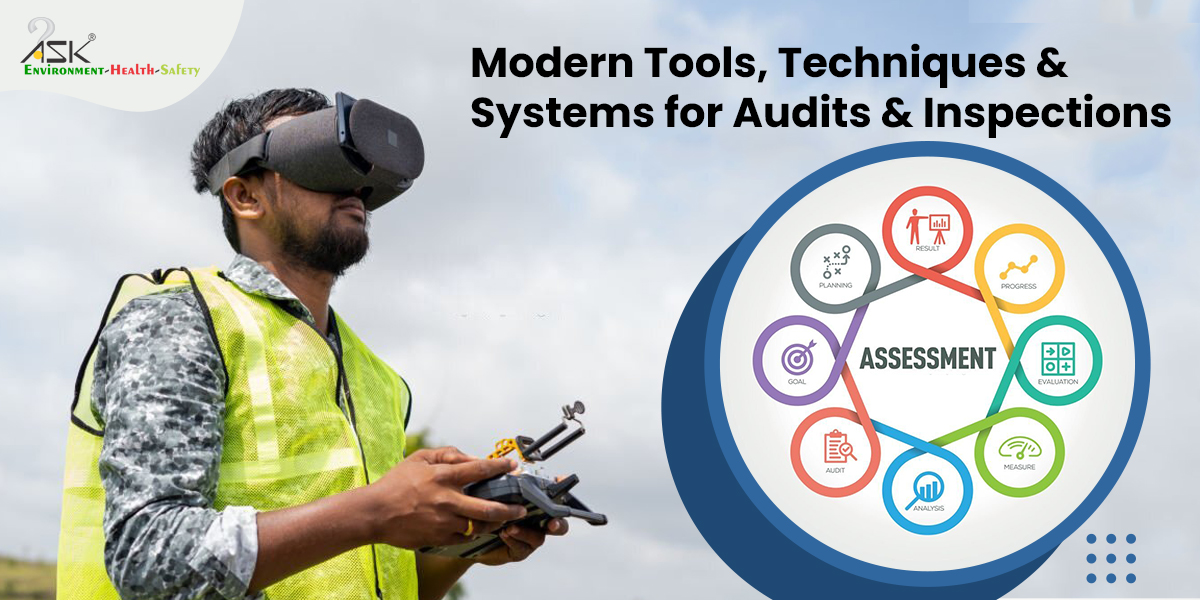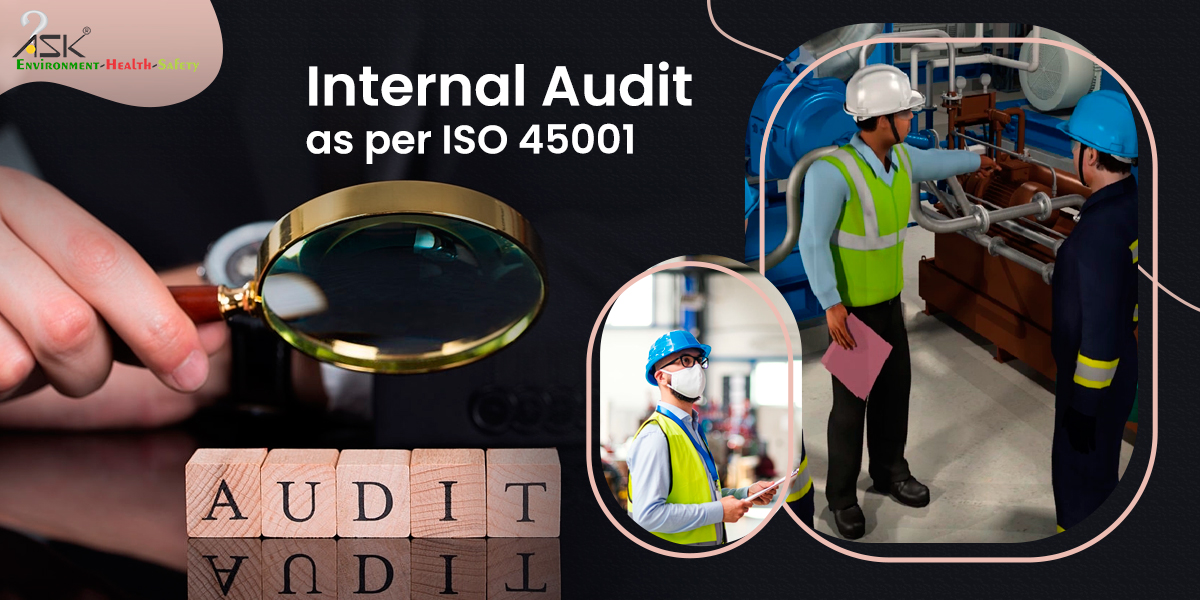Pre-Start-up Safety Review Approach – by ASK-EHS Trainers

The prestart up safety review (PSSR) provides a final check of new and modified equipment to confirm that all appropriate elements of process safety have been addressed satisfactorily and the facility is safe to operate before introduction of hazardous chemicals to the process. The pre-start-up Safety Review is carried out by a multidiscipline team familiar with the operating, mechanical, technical, design and safety requirements of the facility and for a modified facility when a modification is significant enough to require a changes. PSSR is also called operational readiness review having intention of ensuring that the facility is safe for employees and that equipment installed will operate according to design specifications.
Pre-Start-up Safety Review (PSSR) is an essential element of the Process Safety Management (PSM) program mandated by the United States Occupational Safety and Health Administration (OSHA). A PSRM checklist and a field checklist can be used to ensure completeness of the review. The findings of the team are documented, and recommendations are acted on before hazardous chemicals are introduced to the process PSSR needs to be customized to specific process and facility to which it applies. The PSSR process is to confirm all appropriate elements of process safety management have been addressed adequately and that the facility is safe for Start-up. This includes validating that all the action items from other design and construction processes are complete.
A PSSR is required per U.S. OSHA PSM / EPA RMP compliance when any change modifies the PSI, including but not limited to:
- Information pertaining to the technology of the process (i.e., a new control or safety system)
- Information pertaining to the equipment in the process (i.e., new valves or valve operation; a new reactor or process vessel)
- Information pertaining to the hazards of the regulated substances used or produced
Case Study
In March 2005, the BP Texas City refinery suffered a major disaster that killed 15 and injured more than 170 others, as per the detailed report issued by the U.S. Chemical Safety Board (CSB). BP had not properly conducted safety critical checks. The CSB investigators found deficiencies which should have been identified and corrected by application of PSSR, each of which contributed to the extent of the disaster, some of which were:
- an inoperative pressure control valve
- a defective high-level alarm
- an uncalibrated sight-glass level transmitter as well as portable trailers with non-essential personnel located too close to the process.
Properly performed PSSR would have prevented this type of an incident. Guaranteeing a thorough PSSR requires both qualified employees and experienced safety-minded management. The PSSR also should get reviewed and approved prior to processes being allowed to be initiated.
Effectively conducted PSSRs can thwart incidents and the consequential harm to personnel, equipment damage, and loss of production and revenues. According to OSHA, the ultimate responsibility lies with plant or facility management to ensure that a PSSR is properly conducted before a covered process is started.
Methodology to conduct PSSR:
- Compile the process safety information
- Process hazard analysis
- Resolve or implement all recommendations from the process hazard analysis prior to start up
- Check all documents ensuring safety, operating, maintenance and emergency action and response procedures are written, implemented and are adequate
- Refer to Standards or codes, manufacturers’ instructions, and other applicable regulations
- Ensure that construction and equipment is in accordance with the design specifications
- Ensure that training for each employee, involved in handling hazardous chemicals, has been completed
- Arrange for additional training in other areas such as maintenance, emergency action and response or hazard communication
- Ensure that documents related to process safety information, process hazard analysis and material handling policies are made available to facility employees
- Ensure that the start-up of a plant equipment is conducted in accordance with applicable industry standards, manufacturers’ recommendations and/ or plant procedures
PSSR Form Checklist & Managerial Sign Off
The PSSR Checklist used will hinge on the scope of the site’s processes and hazards.
It should be the responsibility of the manager, who will sign off the PSSR, that the plant is ready to start andalso decide whether the short-form or long-form is the most suitable checklist to use. The manager will take into account the complication of the plant, the nature or types of the hazards, and the knowledge and expertise of the carefully chosen PSSR team to take a call on the type of approach to be used.
The PSSR team will finalize the checklist for the manager who will finally ascertain if the equipment is ready for Start-up. In doing so, the PSSR team will list all the measures they consider essential to be completed before the Start-up and those which can be concluded afterwards.
The manager will then take into account the findings of the pre-Start-up team and decide if the plant is ready for the Start-up.
Site Inspection and PSSR Audit
Recently Trainers cum Senior Consultants (in Audit & Training) of ASK-EHS, went for site Inspection and PSSR audit of a private industry involved in Mining and agglomeration of hard coal. The requirement of the industry was to start the operation at the earliest. ASK-EHS Trainers guided the client’s Operation & Maintenance team to comply with the rules & standards in accordance with the Factory Act, Fire Act, Electricity Act, THE COAL MINES PROVIDENT FUND AND MISCELLANEOUS PROVISIONS ACT 1948 (MISSC), etc.

ASK-EHS Experts team guided the private industry for the safe Start-up after 6 years of being in Operation.

The Workflow Process for PSSR has been developed and shared with the safety team of the client.
 Benefits of PSSR
Benefits of PSSR
A PSSR system provides numerous advantages to an organization by incorporating the work of all the various disciplines involved in a team activity, in terms of greater profitability, safety and other enhancements.
- Reduction in Restarts and Start-up delays
- Reduce Risk
- Reduce Start-up/ Shutdown Incidents
- Reduce Production Losses
- Realize Production Goals
- Improve Efficiency
PSSR is generally expedited by a number of checklists that are completed by several areas of expertise. This includes safety, environmental, occupational health, engineering, operation, maintenance, electrical, instrumentation and other regulations. The Team from ASK-EHS, prepared the checklists, ensured required personnel were aware of the hazards and properly trained before a start-up, and quickly accessed and approved PSSR checklist items to resolve actions and findings.
ASK-EHS provides a variety of EHS audit services to clients to help them verify that their activities and operations are in compliance with local regulatory requirements, internal corporate policies and that procedures are proper and pertinent to EHS management standards.
Get in touch with us to know more.


